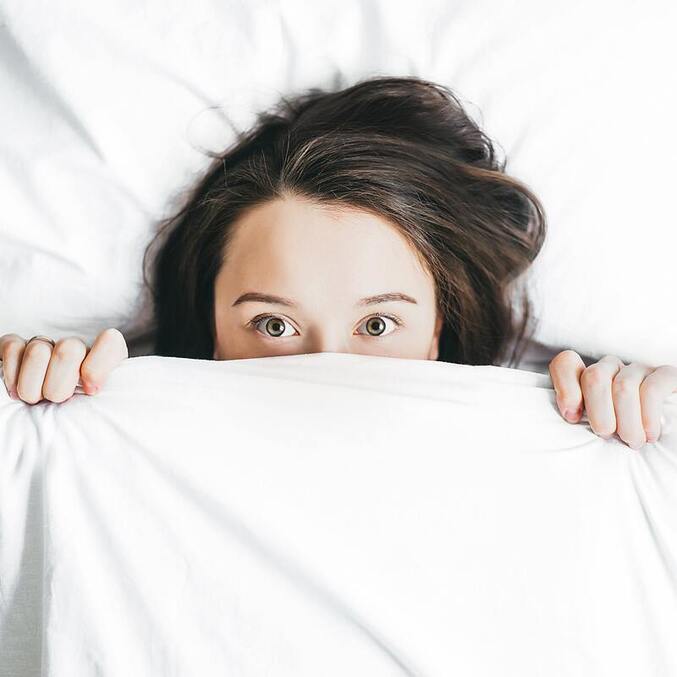|
By Dr. Joti Samra, CEO & Founder of the Psychological Health & Safety (PH&S) Clinic and MyWorkplaceHealth The question:
I am a healthy, active 30-year-old woman. I have not slept through the night in over a year – I always wake up two or three times a night, restless and annoyed and unable to get back to sleep. Do you have tips/mental strategies for falling back to sleep easily? And what can I do to treat this? (I’d prefer not to take sleeping pills). The answer: Chronic sleep problems are very common and impact up to one-third of the population at any point in time. A much higher percentage of people will experience more short-term/transient sleep problems (often tied to particular events that are happening in their life, that resolve when those stressors resolve). The good news is there are very effective cognitive and behavioural strategies that can dramatically improve sleep length and quality. “Insomnia” is a broad term and can include trouble falling asleep, trouble staying asleep and/or early-morning awakening. There are a number of “usual suspects” that reliably and predictably impact our sleep:
You indicate you are healthy and active, which is great (as regular exercise will help improve the quality of sleep). But if you have not had a physical over the last year, I would encourage you to see your family doctor to ensure there is no other medical contribution (anaemia is a very common cause of sleep disruption for women in their menstruating years). If you are taking any prescription medications you may also inquire about whether they have any impact on sleep cycle/quality. Assuming there are no physical causes to your sleep problems, I would do an inventory of current stressors in your life. Worries and anxieties are a huge cause of sleep disruption. Identifying the stressors and taking an active, problem-solving approach to target those stressors would be important. It sounds counter-intuitive, but setting some dedicated “worry time” an hour or more before sleep can be helpful. Set aside 15-20 minutes to sit somewhere quiet (not your bedroom) and spend time thinking about and writing down all the worries that are on your mind that day. Ask yourself “what can I do about this right now”; if there is action to take, take it…usually though there is no immediate action that can be taken, and scheduling a time to deal with the problem can help get it out of your mind temporarily. Engaging in good sleep hygiene behaviours is important (sleep hygiene – like dental hygiene – refers to behaviours that promote good sleep and prevent later sleep problems). Finally, I am glad to hear you say that you are reluctant to take sleeping medications – although they can help with sleep for the short-term, sleep medications are habit-forming, they do not address the core issues that are contributing to sleep problems, and prescribing guidelines only recommend their usage for short, time-limited periods (usually 7-10 days only). The Canadian Sleep Society has some excellent, publicly available brochures on sleep. Excerpted from Dr. Joti Samra’s “Ask the Psychologist” weekly column in The Globe and Mail. By Dr. Joti Samra, CEO & Founder of the Psychological Health & Safety (PH&S) Clinic and MyWorkplaceHealth Taking Medications for Sleep – Do They Work?
Do you struggle with sleep difficulties? Too much on your mind or too much on the go? This is a common problem in the fast-paced world we are living in. Many people are plagued with stress and worry thoughts that make it difficult to fall asleep. Have you used or considered using sleep medication to help you sleep? Many of us have because it seems like a simple and easy solution to our challenges. But are medications for sleep really a good solution? Should you take sleeping pills?Sleep medication, both prescription and non-prescription, should only be used in conjunction with making lifestyle changes and should only be used intermittently, for a short duration of approximately 5-10 days. More extended use leads to drug tolerance, dependence, withdrawal effects, side effects, and rebound insomnia (where sleep problems after medication cessation become worse than they were prior to taking medications). When taking sleep medications, it’s important to note that you should never mix them with alcohol, and you should always ensure you have allowed for at least 7-8 hours to sleep after taking medication, as it can affect your ability to function the next day. What about melatonin? I’m sure you’re thinking, ‘what about melatonin? It is natural isn’t it?’ Yes, melatonin is the key hormone that increases sleepiness. About 50% of people with sleep problems can benefit from up to 3mg of melatonin, taken 0.5 to 1.0 hours before bedtime. But, just because melatonin is a natural hormone doesn’t mean it should be used regularly. Melatonin can cause some side effects including:
It can also interact with other medications. So, the answer to the question should you take sleeping pills? It should also be used sparingly and in conjunction with lifestyle changes, good sleep hygiene, and CBT. Cognitive-behavioural treatment (CBT) is the most effective treatment for sleep problems, as well as associated mood and worry or anxiety issues, all of which commonly impact our ability to sleep. It may also be helpful to talk to your family physician to ensure there are no other underlying issues that may be impacting your sleep. If you’re still struggling with sleep difficulties, sign up for a video consultation with a counsellor at the Psychological Health and Safety Clinic. By Dr. Joti Samra, CEO & Founder of the Psychological Health & Safety (PH&S) Clinic and MyWorkplaceHealth Sleep difficulties are increasingly common these days given the fast-paced world we are living in. There can be multiple contributors to sleep difficulties – and determining the cause of sleep challenges is the first step in finding a solution. One of the best ways to do this is by keeping a sleep diary. So, let’s talk about how to keep an effective sleep diary. Why keep a sleep diary? A sleep diary can be a helpful tool in the process of getting better sleep. It allows you to learn about your sleep patterns and habits, keep you proactive about your sleep, as well as potentially help your health care professional diagnose and treat any sleep disorders. It also provides a unique opportunity to track your sleep treatment and improvements over time. So, how do you keep an effective sleep diary? How to Keep a Sleep Diary The sleep diary should be filled out every morning, within approximately an hour of waking, based on the previous night’s sleep. Setting a reminder on your phone can help – and keep the recording simple, such as keeping a notes file on your smartphone. It’s okay if you miss a day but try to be as consistent as possible. If there’s anything irregular that might affect your sleep – like illness or an emergency, just add a note to that day. When recording information in the diary an approximation is okay. Don’t worry too much about getting every detail exactly right – for example, don’t clock-watch while you’re in bed. Excessive worry can have a negative impact on our sleep. What should be recorded in the diary?There are some things you should regularly record for the most effective sleep diary:
Keep it as simple as possible! An effective sleep diary shouldn’t be a make-work project; since our lives are busy, we should do everything we can to make recording these details as easy as possible. There are many templates you can easily find online via a quick google search of ‘sleep diary’. You can also keep notes on your smartphone as an alternative. One way to make the recording as easy as possible is to have these categories laid out ahead of time so all you have to do is fill in the details. By Dr. Joti Samra, CEO & Founder of the Psychological Health & Safety (PH&S) Clinic and MyWorkplaceHealth The question:
I keep having violent dreams that wake me up in the middle of the night. What’s going on? The answer: We don’t understand very well why we dream, whether dreams have meaning, and why some people have vivid dreams, while others rarely can remember having a dream at all. We do know from studies that look at dream content that we tend to consistently have and remember more negative dreams than positive ones. Some theories suggest that there is an adaptive function to having threatening dreams – it helps us simulate threatening events and situations (in a safe environment) with the result of helping us be more cognitively prepared for threats when they come up in real life. There are a few reasons you may be having violent dreams. It may be that you are currently under a high level stress or that you are (or feel you may be) in a threatening situation that you need to get out of. Consider the current stressors in your life and think about ways you can get help with these difficulties. Individuals who have experienced traumatic events (abuse, assault, life-threatening situations including accidents or illnesses) are at higher risk for having nightmares. A mental health professional can help you work past traumas. Violent dreams can also be the result of a sleep disorder, known as parasomnia. Speak to your family physician if you are having recurrent violent dreams as an overnight sleep study, called a polysomnography, may be helpful to determine the cause. Finally, side effects of a number of medications can include violent dreams and nightmares (as many medications affect the stage of sleep in which we dream – the REM, or rapid eye movement, stage). Changing medications or dosages may help to solve the problem. Independent of the specific cause, there are a number of pre-sleep rituals that may help minimize the intensity or frequency of your violent dreams. Try to minimize talking or thinking about stressful situations before bed. Relaxation or meditation strategies can help to slow your mind and body down. Have a warm bath, or listen to soothing music to distract your mind. Avoid reading books or watching TV or movies with upsetting content. If you are woken by a violent dream, get out of bed and practice some deep breathing and do something relaxing, such as listening to soothing music or having a warm glass of milk, before you get back into bed. Excerpted from Dr. Joti Samra’s “Ask the Psychologist” weekly column in The Globe and Mail. By Dr. Joti Samra, CEO & Founder of the Psychological Health & Safety (PH&S) Clinic and MyWorkplaceHealth The Effects of Chronic Sleep Deprivation: Why We Shouldn’t Run a Sleep Debt
Most of us have probably heard the saying, “I’ll sleep when I’m dead.” This phrase is typically used by those who are living busy lives and are proud of themselves for continuing to hustle. They often prioritize getting ahead in life over the detrimental effects of lack of sleep. Sometimes this phrase is turned into a word of advice, “You can sleep when you’re dead” – but this type of advice could actually be deadly. Here we are going to discuss the effects of chronic sleep deprivation. Many of us think we can get away with less and less sleep – and we certainly can, for a few days or even a few weeks. However, when we go extended periods without catching up on our sleep, there’s a detrimental impact on our physical and emotional health. Sleep is an essential part of our ability to function. During sleep, our body physiologically heals itself and restores its chemical and hormonal balance. Our brain forges new connections and this helps with memory retention. Sleep isn’t a luxury and each time we don’t get enough sleep we are racking up our sleep debt. What is sleep debt? Sleep debt, or chronically running a sleep deficit, is the cumulative effect of not getting enough sleep. People often use the phrase sleep debt to make a comparison to banking. When we don’t get enough sleep, our sleep account becomes overdrawn and we’re required to attempt to make it up. The more sleep debt we accumulate, the more challenging it becomes to repay. According to one study, it can take four days to fully recover from one hour of lost sleep. Making up sleep debt Unfortunately, even though we often refer to it as sleep debt, sleep doesn’t actually work as a bank does. We aren’t able to store up sleep surplus in anticipation of getting less sleep, and we are unable to make up sleep debt indefinitely. https://youtu.be/a-h9Vv5kD0s How to Manage Sleep Debt So, what’s the best way of managing sleep debt? When it comes to our health, prevention is always the best method. So, we should all be aiming for 6 to 9 hours of sleep a night – most nights. We can achieve this by engaging in good sleep hygiene and having a consistent sleep routine. If we’re getting a less-than-ideal number of hours of sleep, we generally shouldn’t go more than a few days without allowing ourselves to ‘catch-up’. What does catching up look like? We allow ourselves a night or two to sleep as much as we need – which should be achieved by getting into bed earlier than usual (rather than excessively sleeping in). One of the important aspects of sleep hygiene is having a consistent sleep schedule in terms of wake and bedtime – and yes, even on the weekends. If we consistently wrack up a small sleep debt over the week and attempt to repay it over the weekend it affects our sleep rhythm. For example, if we work M-F, and sleep in on Saturday and Sunday – this makes it more challenging to go to bed at the appropriate time Sunday. It will also likely affect how we feel when we wake up Monday – and this can lead to a snowball effect in terms of negatively impacting our sleep cycle. The variability in sleep and wake times is less concerning if you aren’t encountering any sleep problems. But, if insomnia or other sleep conditions are at play – being super rigid with sleep schedule is critical as sleep cycle changes can worsen issues. Final Thoughts If you follow the sleep hygiene principles and sleep problems continue, it may be helpful to talk to your doctor. If sleep problems persist, there may be something contributing to your inability to get enough sleep. Cognitive-behavioural treatment (CBT) is one of the most effective treatments for sleep problems. Consider seeing a registered mental health provider to help manage sleep difficulties and support implementing good sleep hygiene principles. Book a consultation with the Psychological Health and Safety Clinic today if you'd like to explore this option. By Dr. Joti Samra, CEO & Founder of the Psychological Health & Safety (PH&S) Clinic and MyWorkplaceHealth Do you lay in bed tossing and turning? Do you check the clock and calculate the number of hours of sleep you’d get if you fell asleep right now? Or think about your list of to-do’s for tomorrow? If so, you’re not alone. So let’s talk about how to manage the negative effects of anxiety on sleep. Anxiety, and associated worry thoughts, have a significant impact on our ability to sleep. And with the high demand world we live in, it’s no wonder that so many people struggle with sleep problems. The tough thing about anxiety and sleep is that it can be difficult to know which comes first. Do we not sleep because we are anxious? Or are we anxious because we can’t sleep? It’s likely both. Stress and anxiety can cause or worsen sleep difficulties and lack of sleep can make us anxious. So, how can we manage our worry thoughts to help us get better sleep? https://youtu.be/8KEbCRXZUqE How to Get Better SleepWorry and anxiety are a normal part of life, but also among the strongest factors that impact sleep. If you are finding worries are preventing you from sleeping, here are some tips to help you sleep better:
Final ThoughtsStill not able to effectively manage the negative effects of worry on your sleep? Cognitive-behavioural treatment (CBT) is the most effective treatment for sleep problems, as well as associated mood and worry or anxiety issues. If worry thoughts persist and continue to have a significant impact on sleep, consider seeing a registered mental health provider. It may also be helpful to talk to your family physician to ensure there are no other underlying issues that may be impacting your sleep.
https://youtu.be/CIOhCas5KUc |
PH&S ClinicEnhancing psychological health, wellness and resilience Archives
July 2024
Mental Health
All
|




 RSS Feed
RSS Feed

